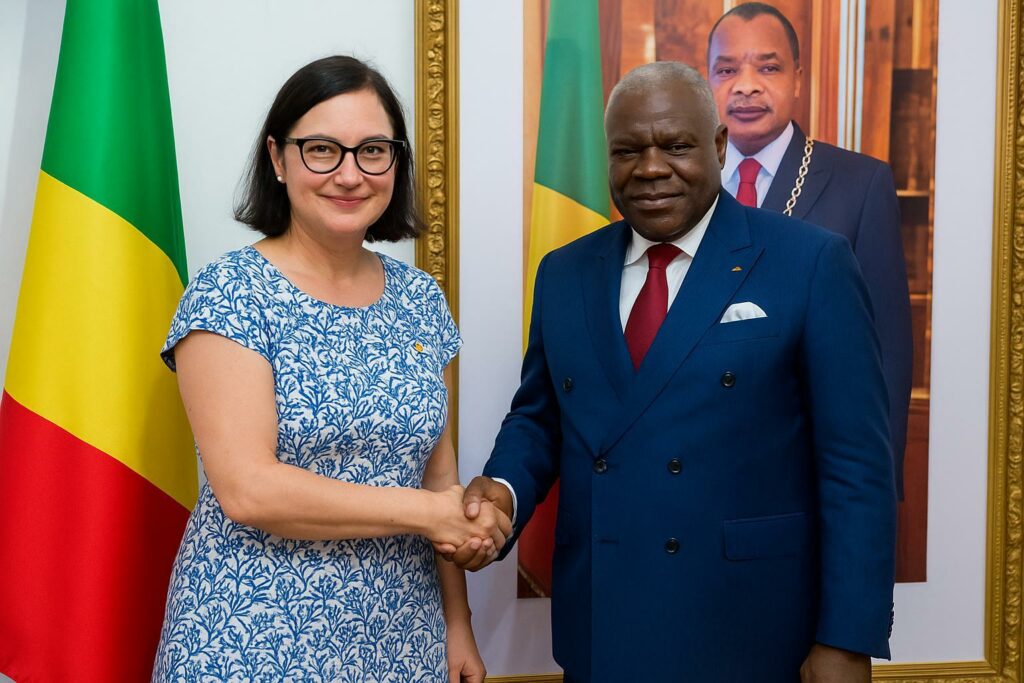Diplomatic Continuity Sealed at the Primature
Barely a fortnight after presenting her credentials in Brazzaville, Maria Vittoria Ballotta was ushered, on 5 September, into the ochre-walled Primature where Prime Minister Anatole Collinet Makosso presided over a concise but symbol-laden audience. According to converging governmental and UN sources, the encounter lasted close to an hour—sufficient, the Italian diplomat suggested, “to confirm in detail UNICEF’s alignment with the National Agenda for Children” while opening a chapter “of continuity anchored in tangible acceleration”.
Ballotta succeeds Rwandan national Chantal Umutoni, whose tenure coincided with the adoption, in 2021, of Congo’s first integrated child-centred policy framework. By pledging steadiness rather than rupture, the new representative echoes the institutional culture of the Sassou Nguesso administration, which privileges incremental consolidation of reforms over disruptive overhauls.
Health and Education: Gains Acknowledged, Gaps Mapped
UNICEF’s latest Multiple Indicator Cluster Survey attributes to Congo-Brazzaville a decline in under-five mortality from 75 to 52 per 1 000 live births between 2015 and 2021, partly owing to expanded vaccination coverage (UNICEF Congo office). Equally, gross primary enrolment is reported at 107 %, an achievement Ballotta publicly described as “a source of national pride”.
Yet the agency notes lingering disparities in quality of care and learning, particularly for children in riverine and forest departments. In the Prime Minister’s view, articulated during the audience, the forthcoming National Development Plan 2023-2027 will “prioritise the last mile”, ensuring that maternal health centres and teacher-training institutes reach the most isolated localities. The representative endorsed this orientation, calling it “both strategic and equitable”.
Climate-Smart Child Protection in Focus
Congo’s dense tropical canopy and its status as the world’s second-lung confer on the country a unique climate diplomacy leverage. Ballotta seized on this ecological capital, arguing that “child survival and climate resilience are now inextricable”. She pointed to the 2023 State of the World’s Children report, which lists floods and vector-borne diseases among the fastest-rising risks for Central African minors (UNICEF 2023).
The government has already earmarked 3 % of next year’s budget for green public spending, including solar-powered cold chains for rural clinics. In an “À retenir” moment of the exchange, both parties agreed to pilot an early-warning system linking meteorological data to school safety protocols.
Financing and Governance Synergies
At the financial level, UNICEF’s country programme envelope stands at USD 69 million for 2024-2026, co-financed by the EU, the Global Partnership for Education and the Japanese Cooperation. Makosso urged that disbursements be synchronised with national treasury cycles in order to avoid idle funds. Ballotta agreed, and proposed quarterly joint steering committees blending line ministries, civil society and donors.
The legal department of the Primature also briefed the visiting envoy on the forthcoming bill to domesticate the Optional Protocol to the Convention on the Rights of the Child concerning a communications procedure, an initiative expected to strengthen judicial remedies for minors. “Le point juridique” thus positions Congo as a regional frontrunner in child-rights litigation, a move welcomed by UNICEF’s protection cluster.
A Partnership Framed for Acceleration
The audience concluded with a symbolic exchange of documents: the draft Cooperation Framework 2024-2028 and a government position note on the National Agenda for Children 2.0. Speaking to local press afterwards, Ballotta emphasised the “multi-sectoral, not merely sectoral” nature of the next phase, vowing to place adolescents’ digital skills and girls’ secondary completion rates at the heart of programming.
For Makosso, the meeting reverberated as a diplomatic signal: Brazzaville remains a trusted interlocutor for multilateral agencies aiming at pragmatic, non-contentious progress. In his words, “the Congolese child is a unifying cause for the nation and its partners alike”. With that shared credo, UNICEF and the government now prepare to translate pledges into budget lines, field visits and, ultimately, measurable outcomes for the country’s 2.3 million minors.

